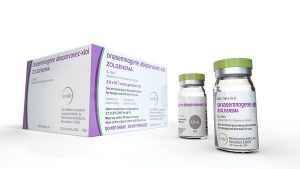
Approved in May, the treatment’s price — set at $2.1 million — stoked concerns about the astronomical costs of potential cures for rare diseases and upset parents who initially could not get insurance coverage for the breakthrough treatment.
Novartis Hid Manipulated Data While Seeking Approval for $2.1 Million Treatment
The failure to report the issue has not put patients at risk, the F.D.A. said, but the drugmaker could face criminal and civil penalties.
By Katie Thomas
Aug. 6, 2019
The drug maker Novartis concealed manipulated data from the Food and Drug Administration while applying for approval of an extremely expensive gene therapy treatment and then delayed reporting the issue, the agency said on Tuesday.
Officials said the inaccurate data, which involved testing in mice of two different strengths of the treatment, did not affect the safety or efficacy of the therapy, Zolgensma, used to treat a rare, often fatal genetic disease called spinal muscular atrophy.
 Approved in May, the treatment’s price — set at $2.1 million — stoked concerns about the astronomical costs of potential cures for rare diseases and upset parents who initially could not get insurance coverage for the breakthrough treatment.
Approved in May, the treatment’s price — set at $2.1 million — stoked concerns about the astronomical costs of potential cures for rare diseases and upset parents who initially could not get insurance coverage for the breakthrough treatment.
The F.D.A. said patients were not at risk, and that the treatment could still be sold.
But the news that a drugmaker had manipulated or mishandled data is an unsettling moment for the pharmaceutical industry. Many companies are racing to develop breakthrough gene therapy treatments for rare and intractable diseases.
Sign Up for NYT Parenting
From the team at NYT Parenting: Get the latest news and guidance for parents. We’ll celebrate the little parenting moments that mean a lot — and share stories that matter to families.
And the F.D.A. has granted a record number of expedited approvals for novel drugs and treatments in recent years, and Zolgensma was among those given top priority.
Dr. Peter Marks, director of the F.D.A.’s Center for Biologics Evaluation and Research, said the drug’s approval probably would have been delayed had the agency known of the manipulated data. The public “expects us to have accurate data when we approve products,” he added.
Dr. Marks said the F.D.A. would continue to investigate and would determine whether Novartis should face civil or criminal penalties.
Shares of Novartis, a Swiss drugmaker that also makes the multiple sclerosis drug Gilenya, were down 2.77 percent, at $88.22 a share, on Tuesday.
In a statement, Novartis said it stood behind its product. “At no time during the investigation did the findings indicate issues with product safety, efficacy or quality,” the company said. “We remain fully capable of releasing high-quality, fully compliant Zolgensma to patients in need.”
Many gene therapy treatments use a disabled virus to carry genetic fixes into human cells, halting some diseases and holding out the possibility of a cure for others.
Although Zolgensma was only the second gene therapy to be approved by the F.D.A. — a blindness treatment, Luxturna, was the first — many more are in the pipeline. By 2025, the F.D.A. has saidit expects to approve 10 to 20 new gene therapies a year.
The one-time gene therapy, made by Novartis, was approved in May to treat spinal muscular atrophy. About 400 babies a year are born with the genetic disease.CreditNovartis, via Associated Press
Spinal muscular atrophy is a rare muscle-wasting disease that, in its most severe form, kills many babies before they turn 2. Spinraza, a drug approved in 2016, also treats spinal muscular atrophy but must be taken for the rest of the patient’s life.
Zolgensma is a one-time treatment and, in clinical trials, it appeared to halt the progress of the disease. The F.D.A. approved the treatment for children under 2 with all forms of spinal muscular atrophy. Novartis has said there are about 400 new patients a year, or about 30 a month.
In addition, 700 patients who already have the disease are eligible for the treatment. Although it is hailed as a breakthrough — and was given expedited approval by the F.D.A. — the multi-million-dollar price tag has given insurers and pause. At least one insurer, UnitedHealthcare, declined to approve some cases, although it later reversed course under pressure from distressed families and intense media coverage.
Erin Kelly, a spokeswoman for the patient group Cure SMA, said in a statement: “We fully trust the regulators to address this issue. Cure SMA will continue to support our families and urge them to work with their clinicians to determine the best course of treatment.”
The F.D.A. said it was notified of the data manipulation issue on June 28, more than one month after Zolgensma was approved, even though officials at AveXis, the Novartis unit developing the product, learned of the problem in March.
The problems involved experiments on mice used in early phases of the research. An F.D.A. inspection report dated July 24 to Aug. 2, 2019 noted lapses and discrepancies in record-keeping by the company, and improper procedures in quality control in gathering data on the mice.
In some instances, the report said, records stating how long the mice lived “were different from the actual value,” and in four cases “discrepancies of greater than one day were noted (ranging from 2 to 19 days).”
The F.D.A. said the data were “mismanaged” or “manipulated,” and declined to say whether the information was deliberately falsified.
“It’s unclear to us, at this point, exactly why this occurred,” Dr. Marks said. In data manipulation cases, he added, the motive is not always clear.
“Many times people do things for stupid reasons, because if they would have left well enough alone, everything would have been O.K.”
Denise Grady contributed reporting.

